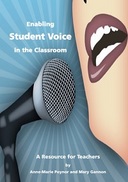Enabling Student Voice in the Classroom
|
Nations involved
Ireland Northern Ireland |
Project leads
Mary Gannon, CDETB Curriculum Development Unit Anne-Marie Poynor, Curriculum Advisory & Support Service, Western Education & Library Board |
Project timeline
January 2011 to April 2015 |
|
This project allowed teachers and their students to work together with the project leads to develop ways of enabling greater student voice in the classroom. Schools generally restrict their inclusion of student voice to Student Councils and the project leads believed that classroom teachers could promote student voice in their everyday practice if they were supported and encouraged to do so. Download the report
The principal outcome was the production of a citizenship education module which is now available to teachers throughout the five jurisdictions. Download the module |
Aim
To find and develop ways of enabling and supporting greater student voice in the classroom
To find and develop ways of enabling and supporting greater student voice in the classroom
Actions
At the 2010 Five Nations Network Conference in Cardiff, the project leads met and recruited two teachers from each jurisdiction to work with them and their students to develop ways of enabling greater student voice in the classroom. With the additional support of the Education for Reconciliation project, they ran two in-service days on student voice for approximately twenty teachers from the two jurisdictions. The in-service took Article 12 of the Convention on the Rights of the Child along with government policy and strategies as the basis for the work. The teachers were introduced to two tools or frameworks for analysis and planning.
Out of the two in-service days, ideas emerged for how teachers could work with their students to help them develop greater voice in the classroom. In consultation with two of the teachers, the project leads created a draft version of the citizenship education module, which was then piloted by four teachers. After several revisions, the module was again piloted with 14 year olds in two schools, one from each jurisdiction. A group of students and the teachers from these schools were then invited to participate in a review day in Enniskillen in May 2014. Following the students’ feedback, final revisions were made to the module, which will soon be published on-line.
Out of the two in-service days, ideas emerged for how teachers could work with their students to help them develop greater voice in the classroom. In consultation with two of the teachers, the project leads created a draft version of the citizenship education module, which was then piloted by four teachers. After several revisions, the module was again piloted with 14 year olds in two schools, one from each jurisdiction. A group of students and the teachers from these schools were then invited to participate in a review day in Enniskillen in May 2014. Following the students’ feedback, final revisions were made to the module, which will soon be published on-line.
Outcomes
- Principal outcome
- Production of a citizenship education module, which is now available to teachers throughout the five jurisdictions
- Outcomes during development and piloting stage
- The realisation by teachers of how little say young people had in decisions that affected them
- Outcomes for the students
- The creation of a safer environment in the classroom and therefore greater freedom to speak out
- Having their opinions listened to and credited with significance
- Greater awareness of how decisions are made and of the importance of their input
- For those who participated in the review day, this was an opportunity to meet and work together and input into the final shape of the module
- Dissemination and wider use of module
- The module will continue to be locally disseminated through teacher and professional development networks in both jurisdictions, as well as being hosted on the websites of the WELB, the CDETB Curriculum Development Unit and the Five Nations website
- Project leads have used activities from the module in other teacher training.
Last edited January 2016

